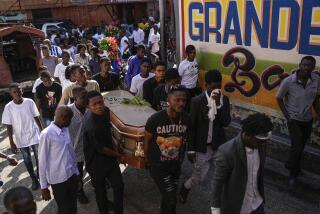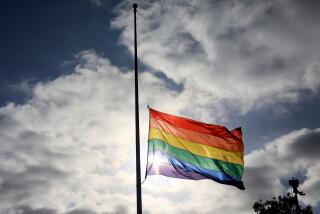Victim in Mandela Scandal Buried : Seipei, 14, Eulogized as Freedom Fighter in S. Africa Rites
- Share via
TUMAHOLE, South Africa — A thousand singing and chanting mourners turned out in this rural black township Saturday to bury favored son Stompie Mokhetsi Seipei, the 14-year-old militant anti-apartheid leader whose murder has been blamed on Winnie Mandela’s band of young bodyguards.
“Stompie, your terribly violent death was an unspeakable crime,” Methodist Bishop Peter Storey said as he gazed at the small, gray and white wooden casket. “But your childhood was already dead. South Africa took away your innocence.”
The white-haired clergyman then voiced a plea for the country’s black majority to heal the wounds created by allegations against Mandela and her live-in bodyguards, the so-called Mandela United soccer club.
“Retaliation cannot bring this child back to life,” Storey said. “Do not injure Stompie further by using this funeral as a platform for revenge.”
Mourners stood atop the wooden pews in St. John the Baptist Church, singing freedom songs, clapping their hands and chanting support for the guerrilla war being waged against Pretoria by the exiled African National Congress.
‘A Young Lion’
Stompie was eulogized as a courageous freedom fighter, “a young lion” of the liberation movement who, at the age of 11, was the youngest person ever detained by the South African authorities and who later commanded a 1,000-strong army of children under 14 in this township.
But the funeral and burial here, 75 miles south of Johannesburg, was subdued compared to other political funerals in South Africa in recent years. No one mentioned the special circumstances of Stompie’s death. And neither Mandela nor any members of her bodyguard force were present--or mentioned by name.
Stompie and three men in their 20s were abducted Dec. 29 from the Methodist church home of the Rev. Paul Verryn, a white pastor, in the sprawling Soweto township near Johannesburg. Police and civic leaders say the kidnapers were members of Mandela United, the controversial soccer club whose members serve as live-in bodyguards for Mandela, wife of jailed nationalist leader Nelson R. Mandela.
The four were taken to Mandela’s red-brick Soweto home, where they were beaten, according to police and sources in the township. The body of Stompie, whom Mandela United members had accused of being a police informer, was found eight days later. He had been beaten beyond recognition and stabbed in the throat, the coroner said.
Two Charged
One of the three survivors escaped and the other two were released after anti-apartheid leaders intervened with Mandela. So far, the soccer team coach and a team member have been charged with murder in the case. The team bus driver has been arrested but not charged.
Mandela, who has denied involvement in Stompie’s death, claims her bodyguards were trying to protect the four men, whom she asserted were being sexually molested by Verryn, the pastor. Verryn and the Methodist church deny the assertions.
Resentment over the team’s activities has been growing for months in Soweto, and anti-apartheid activists fear that community anger with the Mandela soccer club already has spilled over into a bloody factional war.
A Mandela United team member was killed last month, for example, and on Wednesday a 13-year-old was shot to death when a gang of unidentified men opened fire on the home of activists accused in the team member’s murder.
The ANC, the primary guerrilla group fighting white-minority rule, issued a statement Saturday from its exile headquarters in Zambia calling on blacks to avoid “fratricidal” attacks in the townships.
The message here also was conciliatory.
“We shouldn’t point fingers at other people,” said McLean Skhosane, a Tumahole political activist who conducted the funeral. “Stompo was interested in unity. Let his death not divide us.”
Mandela Criticized
Leading anti-apartheid activists, angered by the soccer team’s activities and Mandela’s unwillingness to disband the group, recently called on South African blacks to distance themselves from Mandela.
Saturday’s funeral was the first for a political activist not restricted by authorities since the current state of emergency was declared in 1986. Some political analysts say that Mandela’s troubles, and the rivalries among anti-apartheid groups, help bolster government assertions that a South Africa under black rule would be characterized by violent disagreements.
“The government likes to say this was just another case of blacks killing blacks,” the Rev. Lewis Balink, the church pastor, said before the services began. “But the people know better. They know it was the system (apartheid) that killed him.”
“We confess with shame the way it (Stompie’s life) was ended,” Storey said in his funeral prayer. “(But) this land’s violence can insinuate itself into all our souls.”
Verryn spoke for the first time publicly since the four men were abducted from his church hostel, which has provided shelter in Soweto to hundreds of young activists such as Stompie.
“I have lost a friend. I have lost someone who has challenged me. I have lost a freedom fighter,” Verryn said of Stompie. “May his soul rest in peace.”
More to Read
Sign up for Essential California
The most important California stories and recommendations in your inbox every morning.
You may occasionally receive promotional content from the Los Angeles Times.














